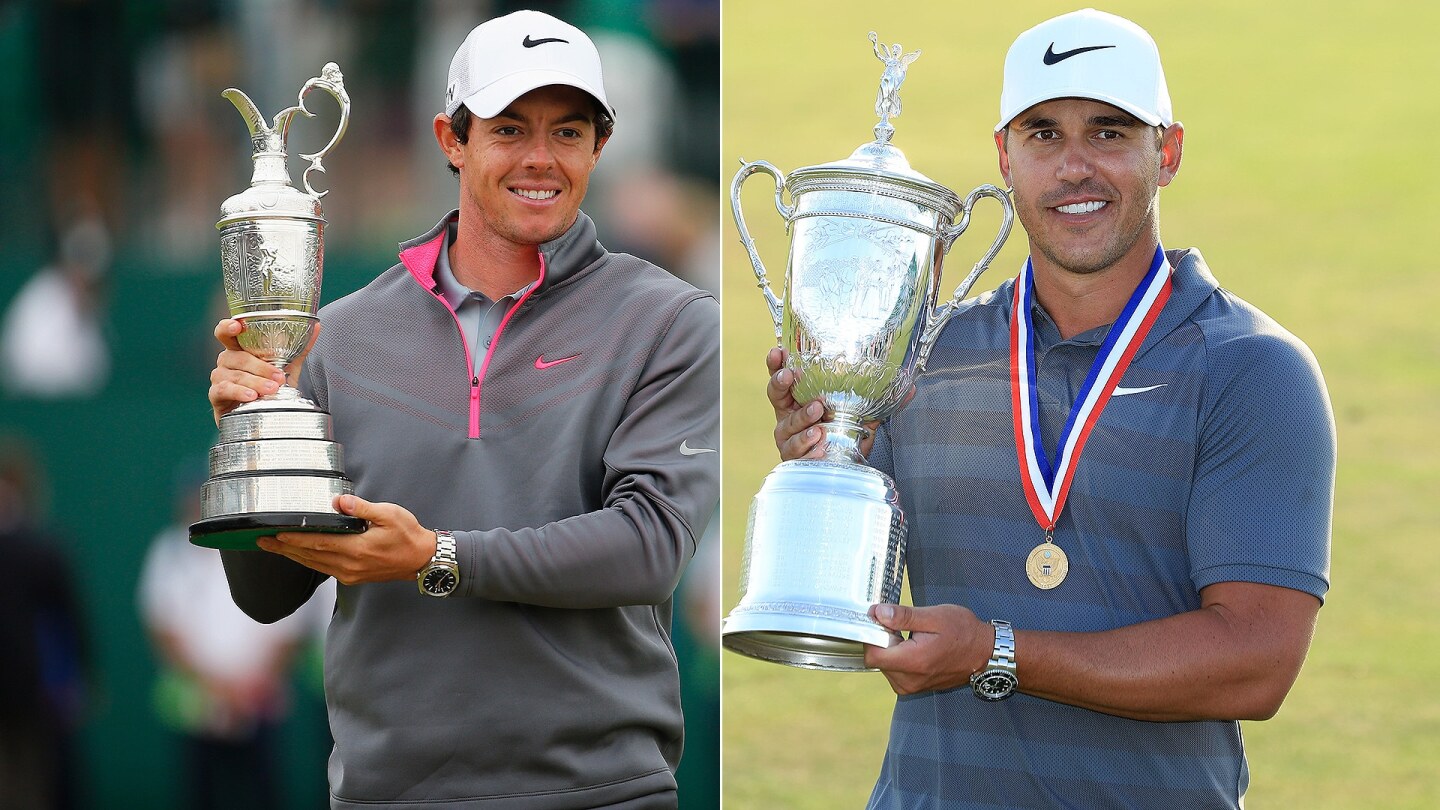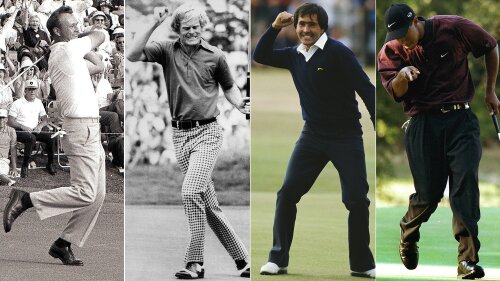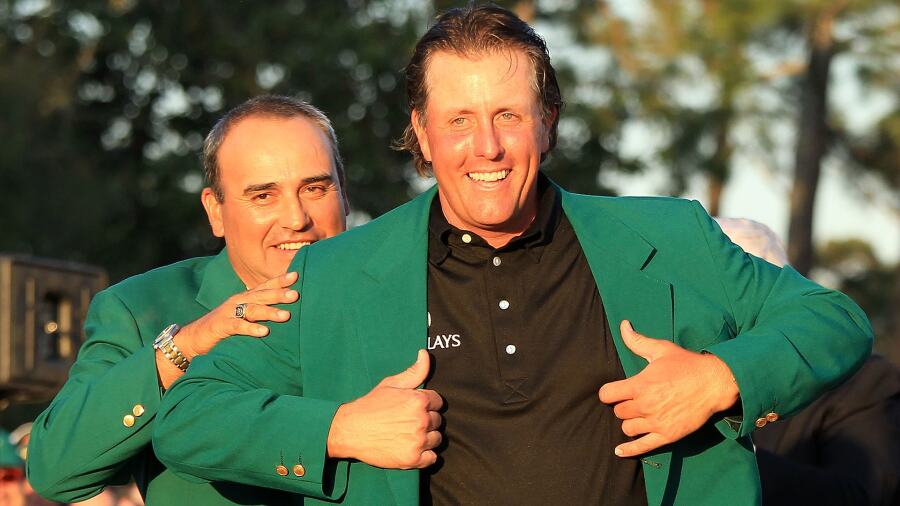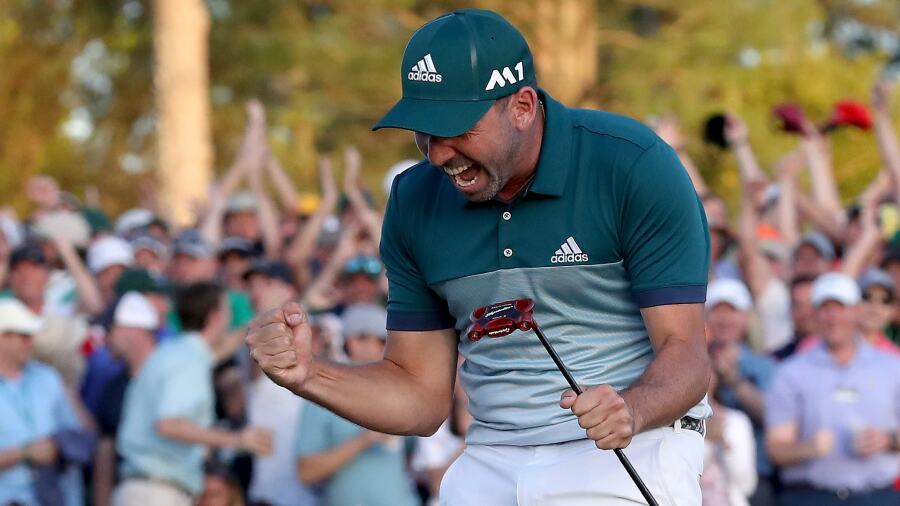It’s hard to believe that though we haven’t reached the end of July, the final men’s major of the year has already been completed. But that’s not all. With the PGA Championship having moved to May, the completion of the 148th Open at Royal Portrush not only ended the Grand Slam season; it also lowered the curtain on the major competitions for this decade.
And what a decade it was. From Phil Mickelson winning the 2010 Masters to Shane Lowry winning in Northern Ireland, 40 majors have been contested. We’ve seen heartwarming victories (Tiger!) and heartbreaking losses; runaway wins and near-misses. Most notably, we’ve seen several players show spurts of greatness, but no one player dominated the decade the way Tiger Woods did from 2000-09. So who was the best player of the ‘10s?
We’ve implemented a simple points system to determine the answer to that question. Our emphasis is on results, with a player earning 20 points for a victory, nine points for second, eight for third, down to one point for finishing 10th (or any player within six strokes of the lead and outside the top 10.)
Because not all runner-up finishes are equal—think Justin Rose’s playoff loss to Sergio Garcia in the 2017 Masters and Lee Westwood finishing seven strokes back of Louis Oosthuizen at the 2010 Open—we’ve allocated two additional points for playoff losers and one additional point for all players who finish one stroke back of the eventual champion.
Finally, players were docked a point every time they missed a major cut.
When the points were tabulated, Rory McIlroy emerged as the Major Player of the Decade, with 141 points, 11 points more than Brooks Kopeka, who came on strong over the past few years. Both Brooks and Rory won four majors, but McIlroy had more chances to earn points, playing in 15 more majors since 2010. As this was not a ranking based on current events – each of the decade’s 40 majors were graded equally – Rory benefits because he was able to play in almost of them. We’re not punishing Koepka for the late start to his career as much as we’re crediting McIlroy with a full decade of top-level performances.
Here’s the top 20:
1. Rory McIlroy, 141 points: Four wins (2011 U.S. Open, 2012 PGA Championship, 2014 Open, 2014 PGA Championship), one second, two thirds, 18 top-10s.
Why Rory? Because even though he missed the cut at Royal Portrush, he was a successful major performer throughout the decade. His four wins tied for the most in the decade with Koepka. His 18 top-10 finishes were the most of any player. And he was the only player to have at least one top-10 in a major in every year from 2010-19. Although Rory didn’t win a major after the 2014 PGA, he did have 10 top-10s over the second half of the decade, including a runner-up finish at the 2018 Open. Ultimately, that’s what set him apart. McIlroy was there at the beginning of the decade and was still a star at the end.
2. Brooks Koepka, 130 points: Four wins (2017 U.S. Open, 2018 U.S. Open, 2018 PGA Championship, 2019 PGA Championship), two seconds, 12 top-10s.
Koepka was a victim of endpoints. There’s no question he has been the best major performer in the second half of decade, but decades begin in a year ending in zero and end in a year ending in nine so by definition our endpoints are not selective. Brooks played just six majors and had only one top-10 finish from 2010-14. From 2015-19, he was phenomenal, with four wins, two runner-up finishes and 11 top-10s. He earned 111 points since 2017 (25 in 2017, 40 in 2018, and 46 in 2019). The fact Koepka finished so close to McIlroy – he would have surpassed Rory had he won the 2019 Open – is a testament to how well he played over the last four years.
3. Jordan Spieth, 109 points: Three wins (2015 Masters, 2015 U.S. Open, 2017 Open), three seconds, two thirds, 10 top-10s.
Like Koepka, Spieth’s career did not span the entire decade, thus depriving him of opportunities to earn more points. Still, Spieth had three wins and three runner-up finishes in 28 majors, including a dominant stretch in 2015, when he won the Masters and U.S. Open before seeing his quest for a Grand Slam end on a Monday at St. Andrews. With his runner-up finish at the 2015 PGA Championship, Spieth earned 57 of his 109 points in 2015, the most of any player in one calendar year in the decade.
4. Dustin Johnson, 100 points: One win (2016 U.S. Open), four seconds, one third, 16 top-10s.
DJ rounds out our first foursome thanks to his win at the 2016 U.S. Open and four runner-up finishes. But the decade could have been so much more for Johnson, who failed to win three times while holding at least a share of the 54-hole lead, and also finished T-5 in the 2010 PGA Championship, after being penalized two strokes for grounding his club in a bunker on the last hole at Whistling Straits. That cost him a spot in the playoff eventually won by Martin Kaymer. Johnson’s 16 top-10s were second most to McIlroy, and he had at least one top-10 finish every year with the exception of 2017.
5. Phil Mickelson, 94 points: Two wins (2010 Masters, 2013 Open), five seconds, one third, nine top-10s.
Mickelson won the decade’s first major and also the 2013 Open, and was sitting pretty with 98 points entering the 2017 Masters. But he fell off the pace over the last three years, failing to finish in the top 10 and missing four cuts in that span, including the 2019 Open, notably making him the latest victim of the undefeated Father Time.
6. Jason Day, 93 points: One win (2015 PGA Championship), four seconds, one third, 15 top-10s.
Like Johnson, Day won one major (the 2015 PGA) and finished second four times. Like Spieth, he was a star in 2015, when he led or shared the 54-hole lead in the last three majors of the year, fighting through vertigo at the U.S. Open to finish T-9 and missing the three-way playoff for The Open title by inches when his birdie putt on the final green didn’t quite get to the hole. He was second twice in 2011 and his 15 top-10s during the decade was tied for third with Adam Scott.
7. Adam Scott, 88 points; One win (2014 Masters) two seconds, two thirds, 15 top-10s.
One of three players to play in every major in the last 10 years (the others to be revealed), Scott became the first Australian winner of the Masters in 2013, and had 14 other top-10s while missing the cut just six times.
8. Justin Rose, 72 points: One win (2013 U.S. Open), three seconds, two thirds, 11 top-10s.
Rose played in 38 consecutive majors to end the decade, after failing to qualify for the 2010 Masters and U.S. Open. He won the 2013 U.S. Open at Merion and, with his three runner-up finishes including a playoff loss to Sergio Garcia in the 2017 Masters, was good enough to complete our second foursome. Rose’s downfall: He missed 10 major cuts in the 10 years, the most of any player who ranked in our top 10.
9. Henrik Stenson, 71 points: One win (2016 Open), one second, three thirds, 10 top-10s.
Stenson had five top-five finishes in majors in the first half of the decade and then won the 2016 Open in record fashion. He stumbled since winning at Royal Troon, finishing no better than T-5 at the 2018 Masters.
10. Tiger Woods, 67 points: One win (2019 Masters), one second, one third, nine top-10s.
What appeared to be a lost decade for Woods turned out quite good when he won the 2019 Masters. Injuries took their toll as he played in just 28 majors, but he still finished with the one win and a total of 67 points. It wasn’t what we expected when the decade dawned considering his 12 major victories from 2000-09.
11. Lee Westwood, 64 points: No wins, three seconds, three thirds, 11 top-10s
With 11 top-10 finishes, including three seconds, Westwood ranks highest among players who didn’t win a major in the decade. Forty-nine of his 64 points came from 2010-14. His T-4 finish at Royal Portrush was a nice bookend to his decade, which began with a runner-up finish at the 2010 Masters.
12. Rickie Fowler, 62 points: No wins, three seconds, one third, 11 top-10s.
Like Westwood, Fowler failed to win during the decade, but he did have eight top-five finishes, highlighted by a 2014 season in which he became the first player ever to finish T-5 or better in all four majors without winning any of them. His T-6 finish at Royal Portrush allowed Fowler to surpass Louis Oosthuizen as the final player in our third foursome.
13. Louis Oosthuizen, 58 points: One win (2010 Open), four seconds, seven top-10s.
How close did the 2010 Open winner at St. Andrews get to becoming a multiple major champion? Pretty darn close. He finished second once in each major – including playoff losses at the 2012 Masters and the 2015 Open. He also lost the 2015 U.S. Open by a stroke when Spieth made birdie on the final hole.
14. Matt Kuchar, 48 points: No wins, one second, one third, 12 top-10s
Kuchar made 39 majors starts, including a runner-up finish to Spieth in the 2017 Open. The only major he missed during the decade was the 2014 PGA Championship, from which he withdrew because of a back injury.
15. Jason Dufner, 44 points: One win (2013 PGA Championship), one second, six top-10s
Another player who made his bones in the first half of the decade and didn’t improve in the second half, Dufner won the 2013 PGA Championship and had 48 points after that win. However, he had just one more top-10 finish and seven missed cuts over the last six years of the decade. He had the most points of any player who did not play in the 2019 Open.
T-16. Bubba Watson, 43 points: Two wins (2012 Masters, 2014 Masters), one second, four top-10s
It’s hard to fathom that a two-time major champ who also lost a major in a playoff can have so few points. But Watson defies logic with just one other top-10 finish in the decade. His points total is lowered considerably by the fact he missed the cut in 15 of his 38 majors. Still, we’ll have Watson complete our fourth foursome; his multiple Masters wins breaking the tie between he and Sergio Garcia.
T-16. Sergio Garcia, 43 points: One win (2017 Masters), one second, eight top-10s
Like Scott, Garcia appeared in every major in the decade but his wonderfully emotional victory in the 2017 Masters, ending nearly two decades of angst in majors, clearly took its toll. Garcia has missed seven cuts in majors since winning that Masters.
18. Martin Kaymer, 41 points: Two wins (2010 PGA Championship, 2014 U.S. Open), five top-10s.’
Kaymer, like Watson, appears to defy convention. He won two majors but rarely accrued any more points with only three other top-10s, none better than T-7. He also missed 11 cuts and was one of two players in our top 20 who did not qualify for Royal Portrush.
19. Zach Johnson, 38 points: One win (2015 Open), one third, seven top-10s
Johnson, the third player to appear in every major in the decade, hasn’t had a top-10 finish since the 2016 U.S. Open (T-8).
20. Zander Schauffele, 37 points: No wins, two seconds, one third, five top-10s.
Schauffele played in the fewest majors of anyone in our top 20, but his 11 starts are punctuated by five top-10s, including a one-stroke loss to Woods in the 2019 Masters and a T-2 at the 2018 Open, when he shared the lead after 54 holes.
Point totals for other major winners this decade:
- Francesco Molinari (2018 Open): 33 points
- Patrick Reed (2018 Masters): 30 points
- Charl Schwartzel (2011 Masters): 28 points
- Keegan Bradley (2010 PGA Championship): 27 points
- Ernie Els (2012 Open): 27 points
- Justin Thomas (2017 PGA Championship): 24 points
- Graeme McDowell (2010 U.S. Open): 23 points
- Shane Lowry (2019 Open): 23 points
- Webb Simpson (2012 U.S. Open): 20 points
- Danny Willett (2016 Masters): 20 points
- Gary Woodland (2019 U.S. Open): 19 points
- Jimmy Walker (2016 PGA Championship): 18 points
- Darren Clarke (2011 Open): 6 points










